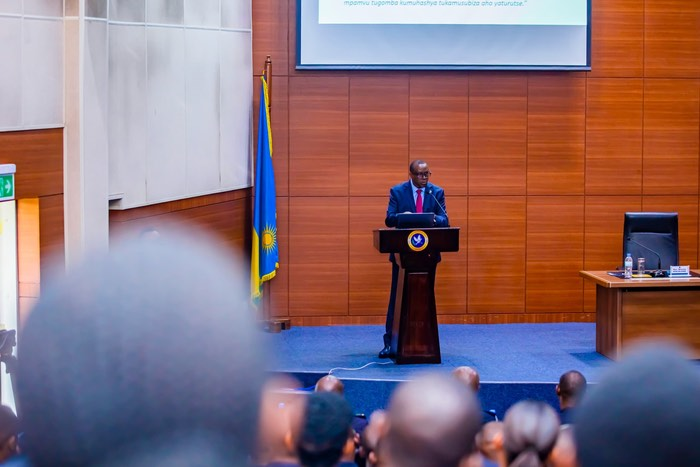
Dr. Jean Damascene Bizimana, Minister of National Unity and Civic Engagement, today delivered a public lecture on the 1994 Genocide against the Tutsi at the Rwanda National Police Headquarters.
The public lecture, held as part of the ongoing 100 days of remembrance, was attended by institutional leaders, senior police officers, and other officials. Participants were taken through the genesis, planning, and execution of the Genocide against the Tutsi, as well as current strategies to counter the persistent ideology behind it.
Dr Bizimana outlined how colonial rule laid the foundation for ethnic divisionism in Rwanda. He explained that identity-based segregation, introduced by colonial administrators and reinforced by missionaries, paved the way for decades of discrimination and, eventually, the Genocide against the Tutsis.
“The genocide was not a spontaneous act—it was a long-planned political project,” Dr. Bizimana said. “Colonial structures and post-independence politicians fueled and institutionalized ethnic hatred supported by different media outlets, political parties, and the army (Ex-FAR). This incited citizens to turn against their fellow Rwandans.”
The minister narrated the escalation of anti-Tutsi violence since 1959, through waves of persecutions and exiles, to the extermination campaign between 1990 and 1994. Dr. Bizimana further highlighted the critical role of propaganda and state institutions in spreading hate speech and justifying mass killings.
To combat genocide ideology today, he emphasized on Rwanda’s holistic approach through education and other sectors by educating youth through school curricula, promoting national identity through the “Ndi Umunyarwanda” program, engaging communities through Itorero and dialogues, and preserving memory of the victims through visits to genocide memorials. There has also been legal accountability on the perpetrators, reintegration of former convicts into society, and digital strategies to counter online hate.
The Inspector General of Police (IGP), CG Felix Namuhoranye, commended the Minister for his in-depth presentation and called for the extension of such programs to police academies, stating that every officer should be grounded in this history, since it shapes the institutional commitment to unity and justice. (End)
